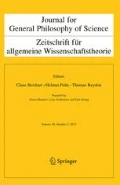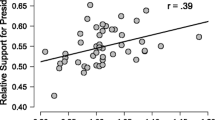Abstract
Wilcox proposed an argument against imprecise probabilities and for the principle of indifference based on a thought experiment where he argues that it is very intuitive to feel that one’s confidence in drawing a ball of a given colour out of an unknown urn should decrease while the number of potential colours in the urn increases. In my response to him, I argue that one’s intuitions may be unreliable because it is very hard to truly feel completely ignorant in such a situation. I further argue that Wilcox must also account for the conflicting intuition that it is absurd to have to feel completely convinced that a specific claim about reality is true in the absence of any evidence in order to avoid being irrational. It is dubious that this intuition is considerably less universal and strongly-held than Wilcox’s own intuition. Finally, I point out that even if Wilcox’s intuition were to be universally shared among members of our biological species, it is far from being clear that someone refusing to let that intuition dictate his or her beliefs would be irrational. For all these reasons, I believe that Wilcox was not successful in proving that philosophers and scientists representing uncertainty through imprecise probabilities are violating the principles of rationality.

Similar content being viewed by others
Notes
While there is still a considerable debate about the nature of physical chances in the literature, I shall just take their existence for granted here.
An objective Bayesian might reply that our knowledge that there are only two possibilities is itself a piece of evidence that favours p(heads) = 0.5 over other possible values. This would, however, beg the question, as it assumes the validity of some form of the principle of indifference and presupposes that merely knowing the outcome space is as good as having tossed the coin a very large number of times. This still looks like what Salmon called “epistemological magic”.
Of course, such a radical revision of her epistemology should normally take at least several weeks.
Someone might object that physical chances and physical probability distributions do not really exist but are only a useful approximation that allows us to successfully model the world we live in. Even in that case, I would still believe that there is a difference between a known and unknown coin but developing that idea would require much further thought.
References
Alexander, J., and J.M. Weinberg. 2014. The “unreliability” of epistemic intuitions. In Current controversies in experimental philosophy, 128–145. London: Routledge.
Augustin, T., F.P. Coolen, G. De Cooman, and M.C. Troffaes. 2014. Introduction to imprecise probabilities. New York: Wiley.
Bartha, P. 2004. Countable additivity and the de Finetti lottery. The British Journal for the Philosophy of Science 55 (2): 301–321.
Benetreau-Dupin, Y. 2015. The Bayesian who knew too much. Synthese.
Bolstad, W.M., and J.M. Curran. 2016. Introduction to Bayesian statistics. New York: Wiley.
Bovens, L., and S. Hartmann, et al. 2003. Bayesian epistemology. Oxford University Press on Demand.
Brower, A.V. 2018. Statistical consistency and phylogenetic inference: A brief review. Cladistics 34 (5): 562–567.
Dawes, R., G. Grankvist, and J. Leland. 2002. Avoiding the ‘ellsberg bag as avoiding a ‘stacked deck possibility rather than avoiding ambiguity. Pittsburgh: Carnegie Mellon University.
De Cooman, G. and E. Miranda. 2008. Symmetry of models versus models of symmetry. arXiv preprint arXiv:0801.1966.
De Cruz, H., M. Boudry, J. De Smedt, and S. Blancke. 2011. Evolutionary approaches to epistemic justification. dialectica 65(4): 517–535.
Ellsberg, D. 1961. Risk, ambiguity, and the savage axioms. The quarterly journal of economics, 643–669.
Feduzi, A. 2010. On Keynes’s conception of the weight of evidence. Journal of Economic Behavior & Organization 76 (2): 338–351.
Fenton, N., and M. Neil. 2018. Risk assessment and decision analysis with Bayesian networks. Boca Raton: CRC Press.
Fischer, M. 2021. On the principal principle and imprecise subjective Bayesianism. European Journal for Philosophy of Science 11 (2): 1–10.
Fischer, M., and A. Vignes. 2021. An imprecise bayesian approach to thermal runaway probability. In International symposium on imprecise probability: Theories and applications, 150–160. PMLR.
Fox, C.R., and A. Tversky. 1995. Ambiguity aversion and comparative ignorance. The Quarterly Journal of Economics 110 (3): 585–603.
Gettier, E.L. 2012. 6. Is justified true belief knowledge? Berlin: De Gruyter.
Good, I.J. 1971. 46656 varieties of Bayesians. American Statistician 25 (5): 62.
Goodman, S.N. 1999. Toward evidence-based medical statistics. 1: The p value fallacy. Annals of Internal Medicine 130 (12): 995–1004.
Hájek, A. et al. 2009. Dutch book arguments. The Oxford Handbook of Rational and Social Choice. Oxford: Oxford University Press.
Harries, C., and D. Hardman. 2002. Decisions, decisions. The Psychologist 15 (2): 65–67.
Herbst, E.P., and F. Schorfheide. 2015. 3. a crash course in Bayesian inference. In Bayesian estimation of DSGE models, 29–62. Princeton: Princeton University Press.
Jaynes, E.T., and O. Kempthorne. 1976. Confidence intervals vs bayesian intervals. In Foundations of probability theory, statistical inference, and statistical theories of science, 175–257. Springer.
Kaikkonen, L., T. Parviainen, M. Rahikainen, L. Uusitalo, and A. Lehikoinen. 2021. Bayesian networks in environmental risk assessment: A review. Integrated Environmental Assessment and Management 17 (1): 62–78.
Kaplan, M. 1998. Decision theory as philosophy. Cambridge: Cambridge University Press.
Keynes, J.M. 1921. Chapter iv: The principle of indifference. A Treatise on Probability 4: 41–64.
Keynes, J.M. 1921b. A treatise on probability. New York: Macmillan.
Kreiss, D., G. Schollmeyer, and T. Augustin. 2021. Towards improving electoral forecasting by including undecided voters and interval-valued prior knowledge. In International symposium on imprecise probability: theories and applications, 201–209. PMLR.
Kriegler, E. 2005. Imprecise probability analysis for integrated assessment of climate change, PhD thesis, Universität Potsdam.
Kyburg, H.E., Jr., J. Kyburg, and C.M. Teng. 2001. Uncertain inference. Cambridge: Cambridge University Press.
Loredo, T.J. 1992. Promise of bayesian inference for astrophysics. In Statistical challenges in modern astronomy, 275–297. New York: Springer.
Lubik, T., and F. Schorfheide. 2005. A Bayesian look at new open economy macroeconomics. NBER Macroeconomics Annual 20: 313–366.
Masegosa, A.R., and S. Moral. 2014. Imprecise probability models for learning multinomial distributions from data. Applications to learning credal networks. International Journal of Approximate Reasoning 55 (7): 1548–1569.
Mercier, H. 2011. What good is moral reasoning? Mind & Society 10 (2): 131–148.
Metzinger, T. 2006. Reply to legrand: Content from the inside out. Psyche 12 (4): 4.
Mobini, S., S. Reynolds, and B. Mackintosh. 2013. Clinical implications of cognitive bias modification for interpretative biases in social anxiety: An integrative literature review. Cognitive Therapy and Research 37 (1): 173–182.
Nado, J. 2016. The intuition deniers. Philosophical Studies 173 (3): 781–800.
Nagel, J. 2007. Epistemic intuitions. Philosophy Compass 2 (6): 792–819.
Nagel, J. 2012. Intuitions and experiments: A defense of the case method in epistemology. Philosophy and Phenomenological Research 85 (3): 495–527.
Nakharutai, N., M.C. Troffaes, and C.C. Caiado. 2021. Improving and benchmarking of algorithms for \(\gamma \)-maximin, \(\gamma \)-maximax and interval dominance. International Journal of Approximate Reasoning 133: 95–115.
Norris, P. 2000. Emotional reasoning. Amherst: University of Massachusetts Amherst.
Norton, J.D. 2011. Challenges to bayesian confirmation theory. In Philosophy of statistics, 391–439. Amsterdam: Elsevier.
Peden, W. 2018. Imprecise probability and the measurement of keynes’s “weight of arguments.” Journal of Applied Logics-IFCoLog Journal of Logics and their Applications 5 (3).
Pettigrew, R. 2020. The principal principle does not imply the principle of indifference. The British Journal for the Philosophy of Science 71 (2): 605–619.
Rinard, S. 2013. Against radical credal imprecision. Thought: A Journal of Philosophy 2 (2): 157–165.
Salmon, W. 1967. The foundations of scientific inference. Pittsburgh: University of Pittsburgh.
Seidenfeld, T. 2004. A contrast between two decision rules for use with (convex) sets of probabilities: \(\gamma \)-maximin versus e-admissibility. Synthese 140 (1/2): 69–88.
Skyrms, B. 1977. Resiliency, propensities, and causal necessity. The Journal of Philosophy 74 (11): 704–713.
Sousa, R.L., and H.H. Einstein. 2012. Risk analysis during tunnel construction using Bayesian networks: Porto metro case study. Tunnelling and Underground Space Technology 27 (1): 86–100.
Talbott, W. 2001. Bayesian epistemology. Stanford Encyclopedia of Philosophy. https://philpapers.org/rec/TALBE
Troffaes, M.C. 2007. Decision making under uncertainty using imprecise probabilities. International Journal of Approximate Reasoning 45 (1): 17–29.
Trotta, R. 2008. Bayes in the sky: Bayesian inference and model selection in cosmology. Contemporary Physics 49 (2): 71–104.
Vlerick, M., and A. Broadbent. 2015. Evolution and epistemic justification. Dialectica 69 (2): 185–203.
Vogelgesang, J., and M. Scharkow. 2017. Bayesian statistics. The International Encyclopedia of Communication Research Methods, 1–9.
Walley, P. 1987. Belief function representations of statistical evidence. The Annals of Statistics 15 (4): 1439–1465.
Walley, P. 1991. Statistical reasoning with imprecise probabilities. In Monographs on Statistics and Applied Probability. https://link.springer.com/book/9781489934734
Walley, P. 1996. Inferences from multinomial data: Learning about a bag of marbles. Journal of the Royal Statistical Society: Series B (Methodological) 58 (1): 3–34.
Walley, P. 2000. Towards a unified theory of imprecise probability. International Journal of Approximate Reasoning 24 (2–3): 125–148.
Wallmann, C., and J. Williamson. 2020. The principal principle and subjective Bayesianism. European Journal for Philosophy of Science 10 (1): 3.
Weinberg, J.M., S. Nichols, and S. Stich. 2001. Normativity and epistemic intuitions. Philosophical Topics 29 (1/2): 429–460.
Wilcox, J.E. 2020. An argument for the principle of indifference and against the wide interval view. Journal for General Philosophy of Science 51 (1): 65–87.
Wilhelm, I. 2020. Centering the principal principle. Philosophical Studies 178: 1897–1915.
Zheng, Y., Y. Xie, and X. Long. 2021. A comprehensive review of Bayesian statistics in natural hazards engineering. Natural Hazards 108: 63–91.
Acknowledgements
I am most thankful to Dr. Seamus Bradley, Dr. Yann Benetreau-Dupin and Professor Mike Huemer for our deep and useful exchanges about the nature of subjective probabilities. I am most thankful for the insightful remarks of the anonymous reviewer regarding my article.
Author information
Authors and Affiliations
Corresponding author
Ethics declarations
Conflict of interest
There is no conflict of interest to be declared for this work.
Additional information
Publisher's Note
Springer Nature remains neutral with regard to jurisdictional claims in published maps and institutional affiliations.
Rights and permissions
About this article
Cite this article
Fischer, M. On Imprecise Bayesianism in the Face of an Increasingly Larger Outcome Space. J Gen Philos Sci 53, 367–379 (2022). https://doi.org/10.1007/s10838-022-09624-3
Accepted:
Published:
Issue Date:
DOI: https://doi.org/10.1007/s10838-022-09624-3




